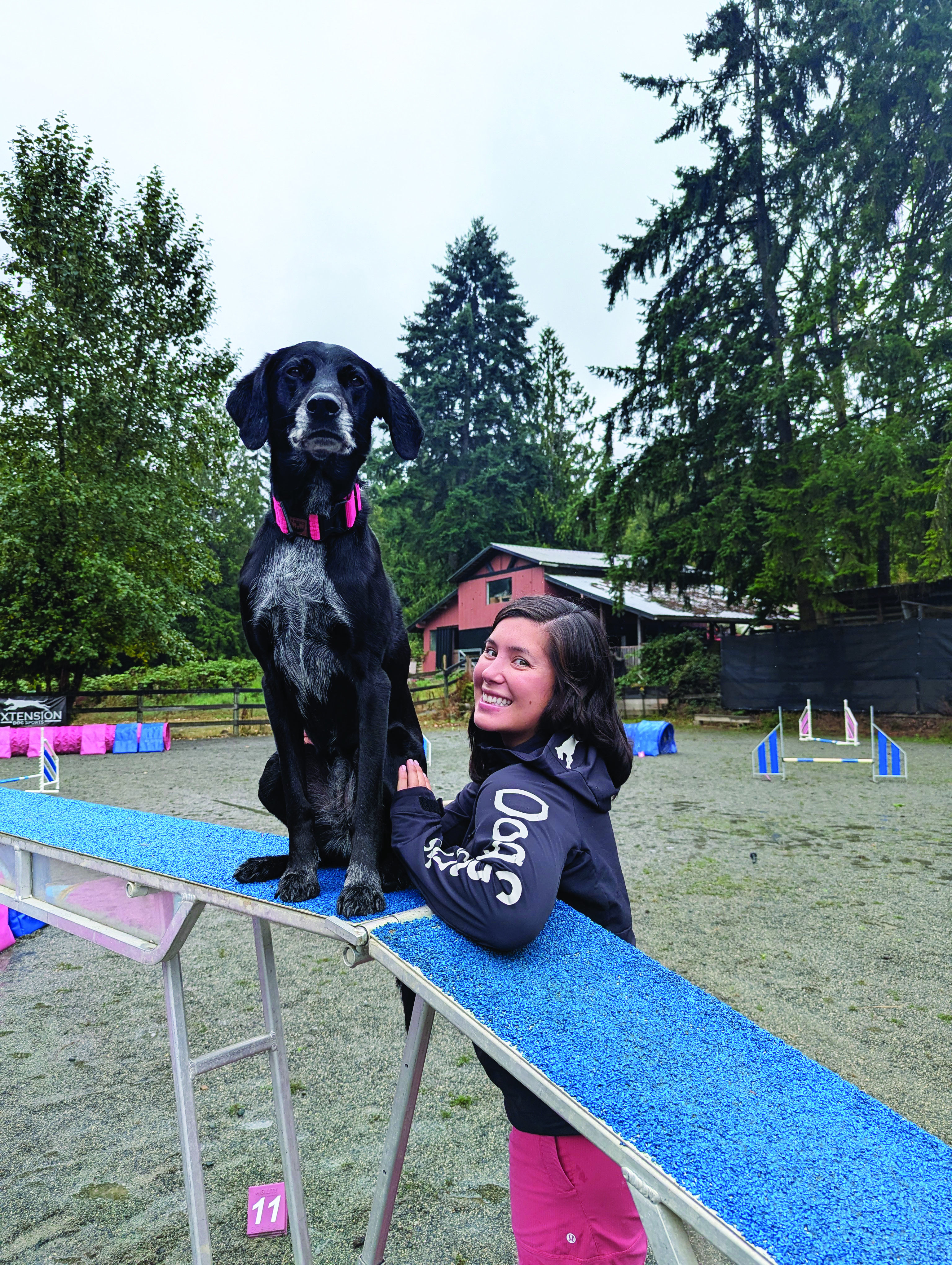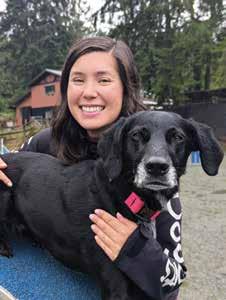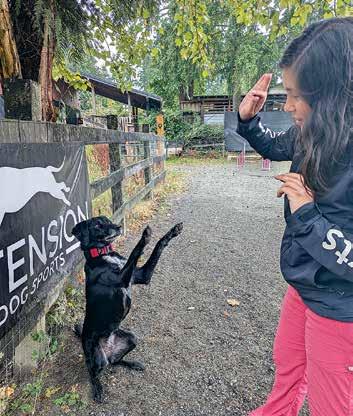
7 minute read
When Ya Gotta Go, Ya Gotta Go
BY KERITH WADDINGTON
At the 2019 Agility Association of Canada Nationals in Ontario, Harley – a local agility dog – proved, in unforgettable fashion, that when ya gotta go, ya gotta go. After five near-perfect runs, she was just one jump away from a national title when after one too many weave poles, she stopped to relieve herself just steps from the finish line.
Not being cursed with self-awareness, Harley remains blissfully unaware of the glory that was snatched from her doggie paws that day. But in every sense that counts, Harley was and is already a winner: she is a beloved family member whose days are filled with frolics through the forest, delicious treats and mental enrichment and whose nights are filled with snuggles and safety. At that rate, who actually needs a ribbon?
Harley, a pointer mix, was Katherine Mitton’s first dog and the one who introduced her to the sport. She is also the inspiration behind Extension Dog Sports, the South Wellington club Mitton launched in 2022. Harley is the silhouette featured on their logo, captured mid-leap in full extension. Together, the two have travelled from puppy classes to being named as alternates for Team Canada at the 2023 World Agility Open – a recognition of just how far they’ve come.
“She used to bark at me or nip if I gave her a late cue,” Mitton recalls with a laugh. “Thanks to her ‘feedback,’ I got better quickly. Our dogs are always our best teachers.”
Mitton’s journey into agility began long before she had a dog of her own. “Years before Harley came along, I was watching YouTube videos, learning as much as possible about dog training,” she says.

When Harley arrived, Mitton signed up for puppy classes and quickly crossed paths with local trainer Tressia Toole of Rave Dog Sports.
“Tressia’s passion was contagious,” she remembers. “I went to watch her compete one weekend, and that was it. I was hooked.”
Within six months, Mitton was volunteering to help with classes in exchange for her own training. “I learned so much in such a short time,” she says. When Toole later moved away, Mitton naturally stepped into a teaching role of her own. Before long, she was thriving both as a competitor and as a coach.
Opening Extension Dog Sports in 2022 felt like the natural next step in that journey. Today, the club welcomes over 100 members, with approximately 50 dogs training weekly at its outdoor arena in South Wellington. “The agility community here is incredibly active,” Mitton says. “I’ve heard that, per capita, Vancouver Island has one of the highest numbers of agility handlers in the country.”
Now, in a full-circle moment, she invites Toole back each year from Prince Edward Island to teach seminars at her club – a way of honouring the coach and now close friend who first inspired her.
In summer, classes run outdoors; when winter arrives, they move to an indoor arena in Nanoose, ensuring year round training.
From the beginning, Mitton wanted more than a program – she wanted a community. “When I first started, I was lucky to have a supportive group cheering me on,” she says. “I wanted to recreate that environment so newcomers feel like they belong right away. Over time, it’s grown into a space where both competitive teams and people who just want to have fun can thrive.”
To the uninitiated, agility might look like a fast-moving puzzle. Courses combine jumps, tunnels, weave poles and climbing obstacles, such as the dog walk, A-frame and teeter. Handlers guide their dogs through in numerical order, aiming for speed and accuracy.
Agility traces its roots back to the late 1970s in England, where it was first staged as halftime entertainment at horse shows. Today, it is a worldwide sport with both recreational and competitive branches.
“It’s not just about teaching the dog the obstacles,” Mitton explains. “It’s about building communication, teamwork and problem-solving while having fun together. Every course is different, which means every run is a chance to learn.”
Staying current in a fast-evolving sport is one of Mitton’s most significant responsibilities. She not only teaches but also judges, competes and studies international trends.

“Course design for agility has changed so much,” she says. “We’re seeing more emphasis on flow, safety and challenges that allow dogs to move more naturally. It’s exciting, but it means you need to keep learning.”
Her philosophy blends science and empathy. “Running agility classes safely and effectively requires a great deal of training – both in understanding dog behaviour and in communicating clearly with people so they can bring out the best in their dogs,” she explains. “Every dog is motivated by different reinforcers, and every team has unique hurdles. Recognizing both is crucial to creating effective, tailored training plans.”
For Mitton, the true reward is not in podium placements but in the bond that grows between people and their dogs.
“Whether new students come to me with a competitive drive or simply for fun, the best part of this sport is how it strengthens that relationship,” she says. “Watching my students achieve their goals – whether it’s a ribbon or simply finding the courage to step onto the start line – is the best feeling.”
Student Janelle Wilson, who trains with her dog Brew, agrees. “The learning never stops, and the focus is always on having fun with your dog,” she says. “It was humbling to discover that anytime there is a communication breakdown, the problem is always the person – never the dog!” she laughs. “Since joining Extension Dog Sports, I have made friends and become a member of an incredible community of like-minded people. It’s been nothing but positive!”
Mitton agrees that agility isn’t always smooth sailing. “The frustrations are just as important as the wins,” she says. “They build the resilience and teamwork it takes to succeed. As a coach, one of the biggest challenges I see is the imbalance in expectations – placing high demands on the dog to perform, while not holding themselves, the handler, equally accountable for supporting their dog. It’s about learning to pivot your training plan to meet your dog’s needs in the moment. That takes time, practice, patience and a good amount of self-forgiveness. But when it all comes together, it feels like magic.”
Agility isn’t just for young border collies with boundless energy.
“Older dogs can absolutely benefit,” Mitton says. “With lower jumps or modified courses, they can still enjoy the game safely while getting all the mental stimulation and joy it brings.
I especially love watching senior dogs play – it gives them life. And at that age, there are no rules. They get as many treats as they want for doing whatever they want.”
While genetics can influence success in the sport, Mitton stresses that all dogs can enjoy it. “It’s time together with their human, they’ll always be grateful for – whether you’re at home practicing or out at a competition. None of that matters to them except the time you’ve dedicated to them.”
Running a dog-sport business on Vancouver Island comes with unique obstacles. Chief among them is finding facilities. Mitton says, “Once I find a location willing to give us a chance, it becomes my responsibility to ensure students are managing their dogs well, respecting our landlords and neighbours, and protecting the privilege of having a place to play. We are very thankful to have two awesome locations.”
For Mitton, agility has been life-changing. “It’s my whole life – both my job and my passion,” she says. “I’ve built lifelong friendships, travelled across North America and grown so much as a person. But most of all, I’m thankful for Harley. I wouldn’t be where I am today without her, and without the trainers who were patient enough to guide us along the way.”
She pauses, then adds with a grin: “Somewhere along the line, you end up with more dogs than you ever planned for and pockets that smell more like treats than money.”
The ribbons may come and go – sometimes just one jump away – but the joy, the community and the lessons from dogs like Harley last a lifetime.
For more information about the club, visit extensiondogsports.com.




